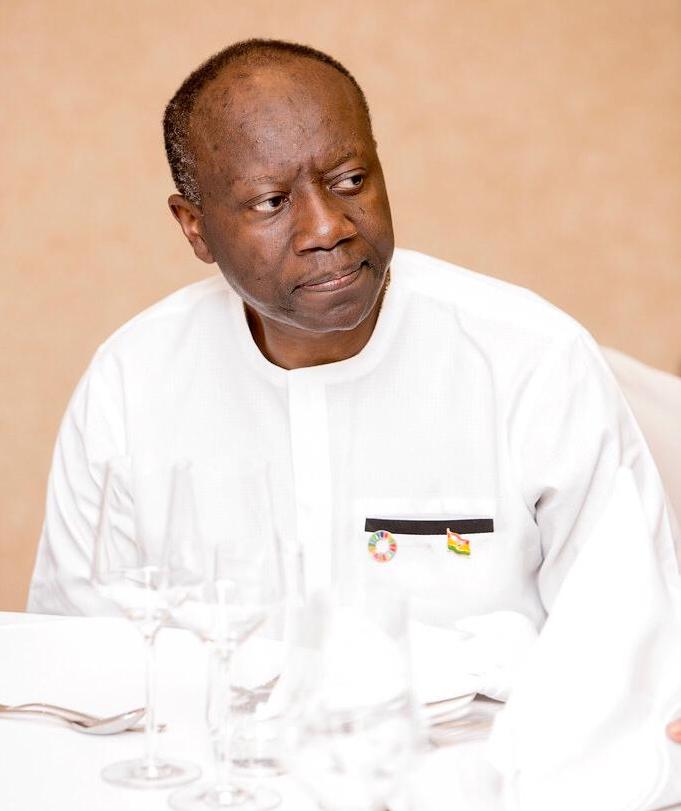|
Getting your Trinity Audio player ready...
|
Economic activity has been massively disrupted; hotels are closing, industry is tottering, airlines are grounded, and our toast-of-the-region airport lies asleep. The Bank of Ghana cut rates by 150 basis points and reduced the reserve requirements by 2 per cent, enabling banks to increase their lending to the private sector by some $500m — a good effort, but an underwhelming response to what should be done. I need answers.
A U-shaped recovery is touted, but ours will likely be a steep drop, then a two- to three-year downward slide before a recovery; a trapezoid-shaped recovery! Back to completing our schedule for the day. [Bank of Ghana] governor [Ernest] Addison and I finish Ghana’s application for the IMF’s rapid credit facility. However, Ghana and Africa desperately need fresh capital. We will work with the World Bank for a renewed approach. (I wonder what past bank heads such as [Robert] McNamara and [James] Wolfensohn would have been thinking at this time.)
We are interrupted by a call. One of our major partners in the energy sector from Europe has triggered a letter of credit facility for $200m. I am outraged at such callousness. I am reminded of the parable in Matthew where a man’s debt is forgiven, but he then finds the fellow servant who owes him and has him thrown in jail. I am now even more convinced that the African finance ministers’ proposal for a debt standstill and issuance and/or mobilisation of special drawing rights should be extended for two years and not be limited to low-income countries only.
So, what is the world coming to? Extraordinary times, sobering times. Ghana, at the last count, had 636 cases and eight deaths. Analysis by the University of Ghana’s Noguchi Memorial Institute for Medical Research indicates that about four-fifths of the first 300 cases were direct imports; the virus’s genetic sequencing shows its origins are from Wuhan through Norway, the UK, Saudi Arabia, Hungary and India.
What does an African finance minister do now? How can we restore 10-15 per cent of GDP over a two- to three-year period? This is not a passing blizzard, as a friend said; more like a long winter, even a mini ice age. But there are some structural elements that need fixing; our health sector, digitalisation of the continent to formalise our economies; and Africa’s debt — the most controversial element and the topic of much discussion. Africa’s external debt stock is more than $700bn. Africa needs to pay $44bn to service our debt this year.
The world is changing. The German chancellor doesn’t want to hear about debt-to-GDP ratios. Unthinkable stimulus packages are being announced, trumping orthodoxies and with no talk of a moral hazard: the G20 packages may end up close to $8tn. Their generous tool kits are not available to us. I am green with envy.
To be honest, there is a lump in my throat as I think of Africa’s predicament. I question the unbalanced nature of the global architecture. I have, in one fell swoop, lost more than $1bn of revenue as domestic taxes continue to shrink, compounded by lost productivity and job losses. We still have an obligation to service our debt portfolio. These are grave times, surpassing the Spanish flu epidemic in 1918. Where is the leadership and global task force that would mirror the 1944 Bretton Woods monetary conference?
This unprecedented crisis has brought capitalism “to a juddering halt”, as Arundhati Roy wrote in FT Weekend. I think of Ben Okri’s poem [with the line] “Will you be at the harvest?” where he inspires us to remake the world for a new era through our human genius, so our future becomes greater than our past.
It is 1am. We have had a long day. We had to launch a sanitation campaign; we had video and teleconferences with [former UK prime minister] Gordon Brown, African finance ministers, the World Bank’s David Malpass and Kristalina Georgieva of the IMF, the Center for Global Development and the faith-based organisations — our partners in distributing food. I have also been tested for Covid-19 and am anxiously awaiting the results. I am sleepy. I murmur through Psalm 23: “The Lord is my shepherd . . .”
Ken Ofori-Atta is Ghana’s minister for finance





